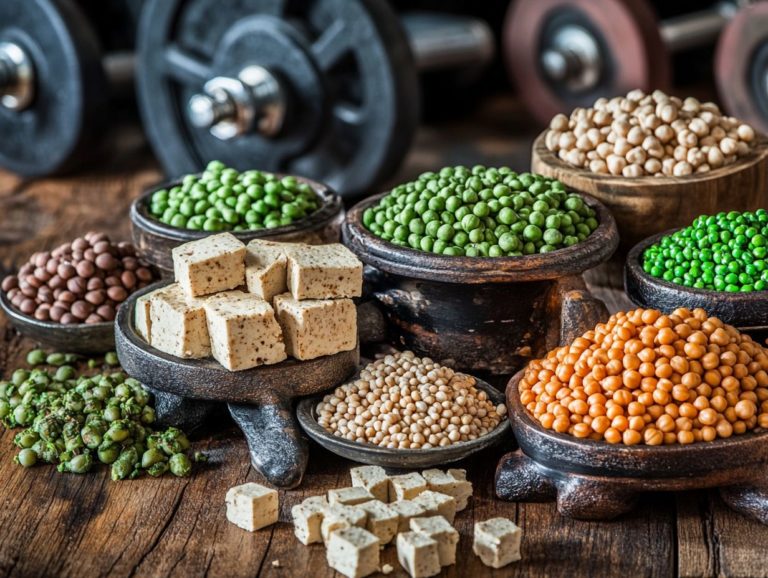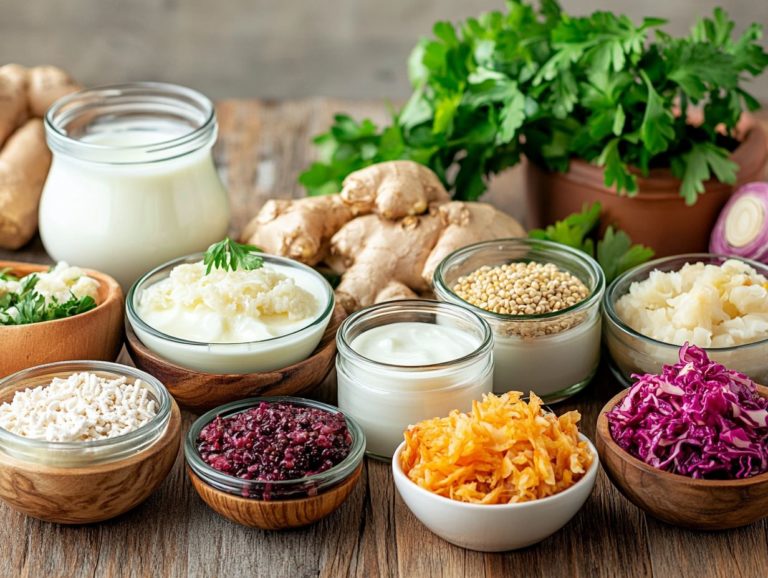10 Foods Rich in Omega-3 Fatty Acids
Omega-3 fatty acids are essential nutrients that significantly contribute to your overall health, supporting everything from heart function to brain vitality.
Dive into the world of foods rich in these beneficial fats, featuring delectable options such as salmon and walnuts that not only satisfy your taste buds but also nourish your body.
Discover the various types of omega-3s, their incredible health benefits, and the recommended amounts you should strive to include in your daily diet.
Whether you re a seasoned health enthusiast or simply curious about nutrition, you ll learn how to seamlessly integrate these powerhouse foods into your meals for optimal wellness!
Contents
- Key Takeaways:
- 1. Salmon – A Rich Source of Omega-3
- 2. Mackerel – A Nutrient-Dense Fish
- 3. Sardines – A Small Nutritional Powerhouse
- 4. Tuna
- 5. Trout
- 6. Herring
- 7. Flaxseeds
- 8. Chia Seeds
- 9. Walnuts
- 10. Soybeans
- 11. Spinach
- 12. Kale
- 13. Brussels Sprouts
- 14. Algas
- 15. Supplements
- What Are Omega-3 Fatty Acids and Why Are They Important?
- Frequently Asked Questions
Key Takeaways:
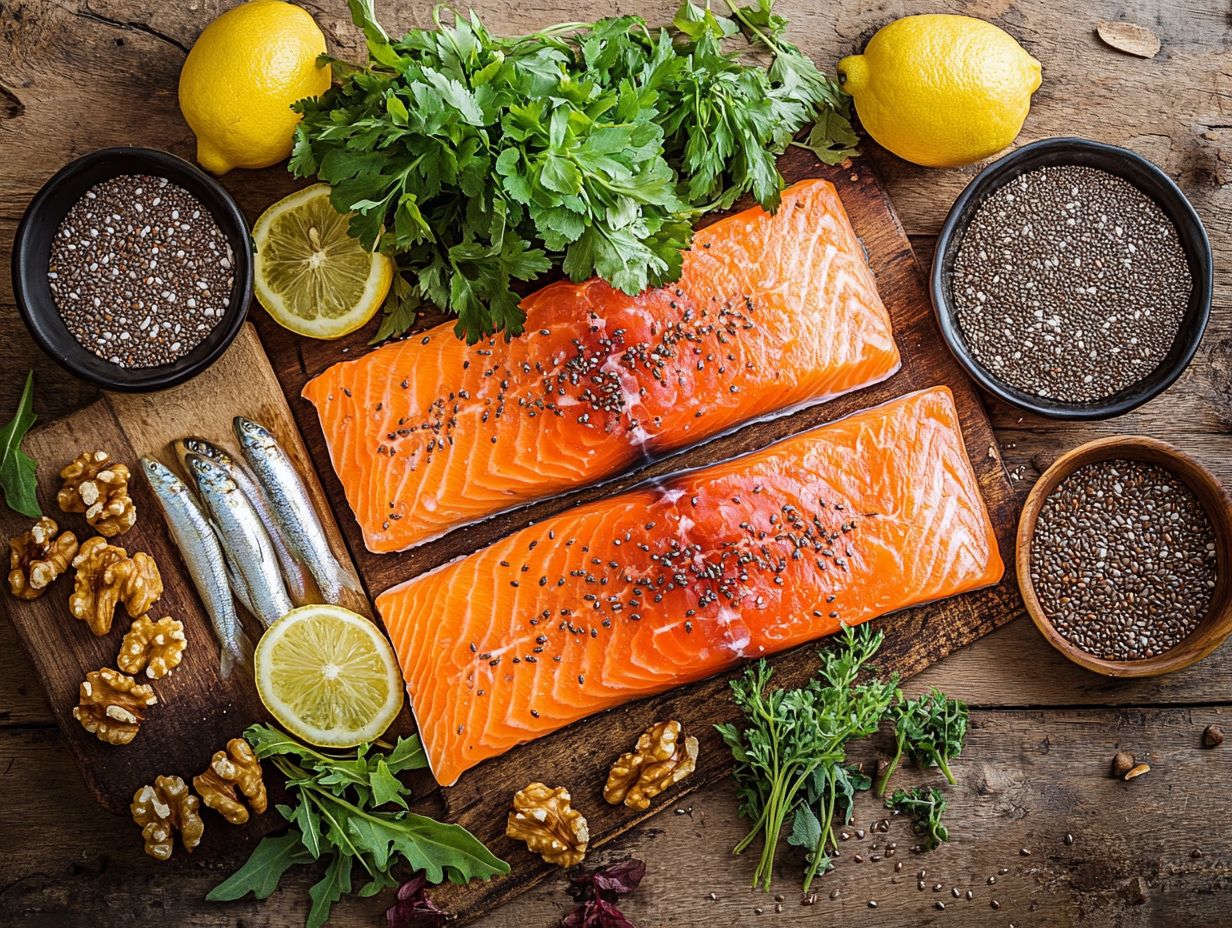
- Incorporating omega-3 rich foods can improve heart health and reduce inflammation.
- Plant-based sources like flaxseeds and chia seeds are excellent for vegetarians and vegans.
- Consider supplements if you don t get enough omega-3s from food.
1. Salmon – A Rich Source of Omega-3
Salmon isn t just a delightful choice for dinner; it s a great source of omega-3 fatty acids, particularly two important types, DHA and EPA. These fats bring a wealth of health benefits to the table!
Enjoying salmon can enhance cardiovascular health and reduce inflammation, making it an essential component of a balanced diet rich in these vital fats.
This remarkable fish not only impresses with its rich flavor but also boasts an impressive omega-3 profile. It plays a significant role in promoting heart health by lowering triglyceride levels and enhancing blood vessel function.
These fatty acids are crucial for cognitive function, supporting both memory and mood stability.
When you compare salmon to other omega-3-rich foods like flaxseeds and walnuts, which primarily contain ALA, salmon provides a direct source of the highly beneficial DHA and EPA. To truly optimize your omega-3 intake, aim to enjoy salmon at least twice a week. Enjoy a delicious meal while nourishing your body!
2. Mackerel – A Nutrient-Dense Fish
Mackerel stands out as an exceptional source of omega-3 fatty acids, particularly EPA and DHA, delivering a nutrient density that supports both heart health and optimal brain function.
This flavorful fish comes in various species, including Atlantic and Pacific mackerel, each packed with a generous amount of these essential fats.
The high omega-3 levels in mackerel play a pivotal role in managing triglyceride levels, which is key in reducing the risk of heart disease and promoting overall cardiovascular health. These fatty acids have anti-inflammatory properties that may help alleviate conditions like arthritis!
To savor mackerel while preserving its beneficial oils, consider grilling it with fresh herbs or baking it with a splash of lemon juice and olive oil. This way, you ll create a delightful meal that s not only nutritious but also absolutely delicious.
3. Sardines – A Small Nutritional Powerhouse
Sardines may be small, but they are a powerhouse when it comes to omega-3 fatty acids, providing an impressive dose of EPA and DHA essential components for reducing the risk of chronic diseases and improving brain function.
These small fish are a nutritional miracle, making them an excellent addition to any diet, whether vegan or not. By incorporating sardines into your meals, you can access vital nutrients that support cardiovascular health, promoting better blood circulation and reducing triglyceride levels.
For those who enjoy a non-vegan diet, adding sardines to salads, pastas, or grain bowls can effortlessly elevate the nutrition of your meal.
If you re environmentally conscious, prioritize sustainable options by looking for MSC certified labels to ensure your choices support responsible fishing practices. This simple adjustment benefits not only your health but also contributes to the well-being of our planet!
4. Tuna
Tuna is a seafood favorite known for its rich omega-3 fatty acids, especially EPA, which are good for your health and can enhance heart health. However, be cautious about mercury poisoning.
Different species of tuna like Albacore and Bluefin offer varying levels of omega-3 and mercury. Albacore, often found in canned tuna, has a higher concentration of omega-3s but also tends to have elevated mercury levels.
On the other hand, Skipjack tuna, commonly used in popular canned brands, has lower mercury content. This makes it a healthier option for regular consumption.
To minimize health risks, especially for pregnant women and young children, limit your intake to just one serving per week. Choose lower-mercury varieties or alternative seafood rich in omega-3s, like salmon or sardines, to enjoy heart-healthy benefits without the risks.
Don t miss out on the heart-healthy benefits of omega-3s! Choose the right tuna for your health today!
5. Trout
Adding trout to your meals brings heart-healthy benefits and delicious flavors! This fish is a remarkable source of omega-3 fatty acids, particularly EPA, making it a great choice for promoting heart health and reducing inflammation.
Trout’s omega-3 content can rival that of popular fish like salmon, providing significant benefits for cardiovascular wellness. Its gentle flavor and versatility in cooking make it a favorite.
Whether you grill, bake, or pan-sear it, these cooking methods maintain its healthy fats and enhance its flaky texture. With light seasoning and healthy techniques, you can enjoy its full nutritional profile without sacrificing taste.
Incorporate trout into your diet and enjoy a delicious meal prepared in various ways!
6. Herring
Herring is a small fish packed with omega-3 fatty acids, especially DHA, that supports brain function and heart health. This nutrient-rich fish enhances cognitive function and may help slow cognitive decline as you age.
Prepare herring by smoking, pickling, or grilling it to elevate its nutritional profile while enjoying its delicious flavor. Its versatility allows you to easily include it in various cuisines, boosting your omega-3 intake.
7. Flaxseeds
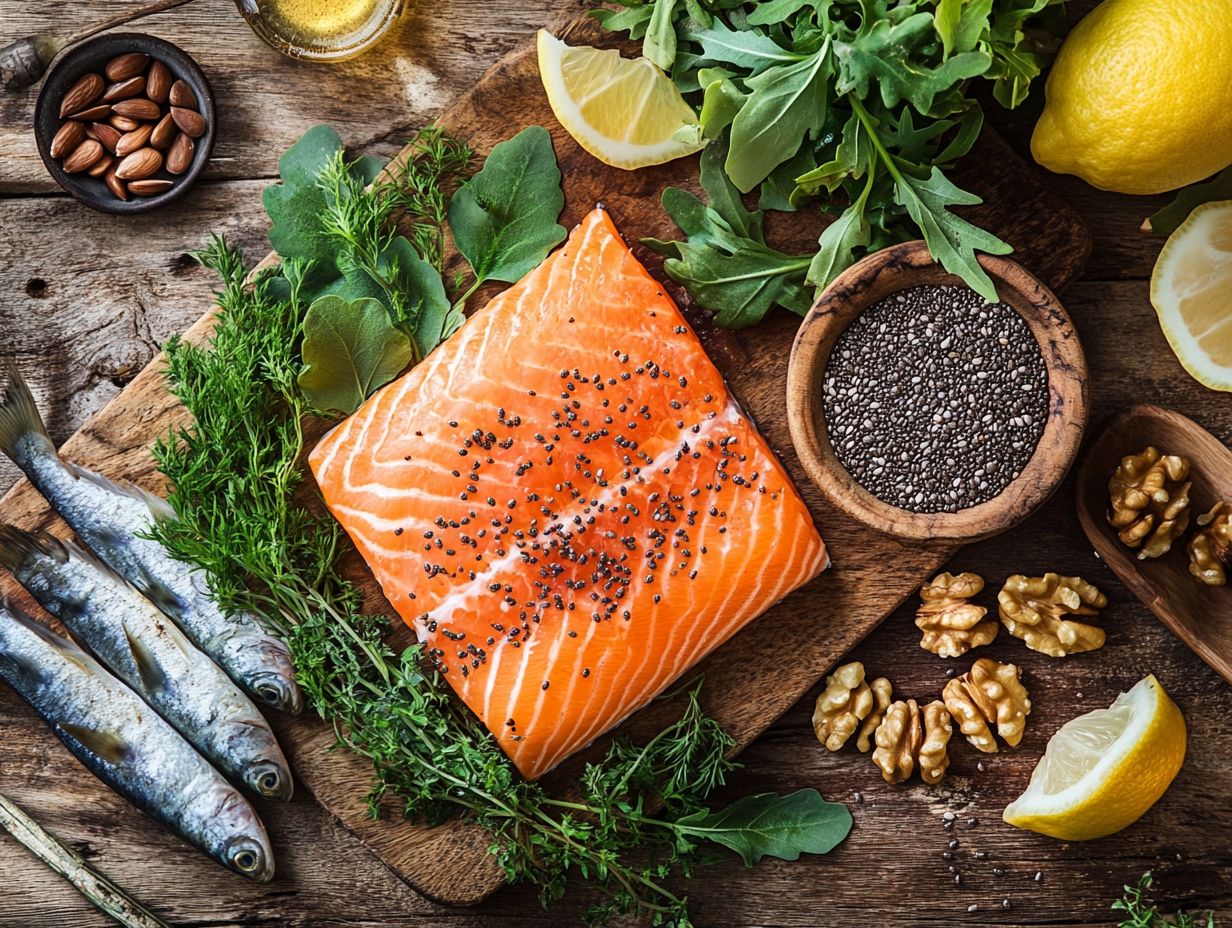
Flaxseeds are one of the richest plant sources of omega-3 fatty acids, particularly alpha-linolenic acid (ALA). If you’re looking for vegan sources of essential fats, these little powerhouses are a must-have in your pantry.
Incorporating flaxseeds into your balanced diet offers significant health benefits, including strong anti-inflammatory properties that can combat chronic diseases. Research shows that ALA may reduce inflammation, potentially lowering your risk of heart disease and arthritis.
The versatility of flaxseeds is impressive; they can be easily integrated into smoothies, oatmeal, or baked goods, adding a delightful nutty flavor. For optimal health benefits, use ground flaxseeds, as they release their nutrients more effectively.
This makes flaxseeds an excellent choice for anyone looking to boost their overall well-being and support heart health naturally.
8. Chia Seeds
Chia seeds are an exceptional vegan source of omega-3 fatty acids, particularly rich in alpha-linolenic acid (ALA), offering an impressive array of health benefits like enhanced cardiovascular health and improved brain function.
These tiny powerhouses are nutritionally dense, packed with dietary fiber, protein, and essential minerals such as calcium, magnesium, and phosphorus.
Incorporating chia seeds into your diet is simple; sprinkle them on salads, blend them into smoothies, or stir them into oatmeal for an effortless health boost.
When soaked in liquid, chia seeds take on a delightful gel-like texture, making them great as a thickening agent for puddings or energy bars. This versatility allows you to enjoy their many advantages in various delicious meals.
9. Walnuts
Walnuts are a remarkable choice when it comes to nuts, particularly for their omega-3 fatty acids, specifically alpha-linolenic acid (ALA), a type of omega-3 fat that is good for your heart.
Incorporating them into your diet can yield many health benefits. These benefits include improved heart health and reduced inflammation.
What sets walnuts apart from many other nuts is their impressive ALA content, rather than just the typical monounsaturated or polyunsaturated fats. This makes them an exceptional addition to a balanced diet.
Omega-3s also support cognitive function, which makes walnuts a smart choice for brain health.
You can effortlessly enhance your meals by sprinkling walnuts into salads, blending them into smoothies, or using them as a crunchy topping for yogurt.
Start adding walnuts to your meals today for a healthier heart and sharper mind!
10. Soybeans
Soybeans are not just a versatile food source; they re also a powerhouse of omega-3 fatty acids in the form of alpha-linolenic acid (ALA), making them an essential part of your vegan diet.
Beyond these heart-healthy fats, soy products offer a treasure trove of high-quality protein, fiber, vitamins, and minerals. These nutrients contribute to lowering cholesterol levels and enhancing your overall cardiovascular health.
When you incorporate soy products like tofu and edamame into your meals, you’re not just nourishing your body; you’re also treating your taste buds. Picture a simple stir-fry featuring vibrant vegetables and cubed tofu a delicious, nutrient-dense dish that s as satisfying as it is wholesome.
Consider whipping up a refreshing edamame salad or a comforting bowl of miso soup to savor the delightful benefits of soy. By weaving these wholesome ingredients into your daily meals, you can elevate your health while enjoying the culinary flexibility that soybeans offer.
11. Spinach
Spinach might not be the first food that pops into your head when you think of omega-3 fatty acids, but it offers a valuable source of alpha-linolenic acid (ALA) along with a host of other health benefits.
Integrating this leafy green into your omega-3-rich diet can significantly enhance your overall nutrient intake. For instance, saut ing spinach in a splash of olive oil not only elevates the flavor but also aids in the absorption of fat-soluble vitamins present in the greens.
Blending spinach into smoothies with flaxseeds or chia seeds creates a nutrient-dense breakfast or snack that can substantially increase your omega-3 levels.
By experimenting with various cooking techniques and pairing spinach with other omega-3-rich foods, like walnuts or fatty fish, you can truly unlock its potential for nurturing a balanced and health-conscious diet.
12. Kale
Kale is not just another leafy green; it s a powerhouse of nutrients, offering omega-3 fatty acids in the form of alpha-linolenic acid (ALA) that can elevate your diet significantly.
By weaving this vibrant vegetable into your meals, you can tap into its anti-inflammatory properties, which are essential for lowering the risk of chronic diseases. The omega-3 content in kale supports heart health, sharpens cognitive function, and enhances the vitality of your skin.
Its rich supply of antioxidants works in harmony with ALA to combat oxidative stress, promoting your overall wellness. Making kale a regular part of your diet now can lead to improved joint health and a fortified immune system.
Incorporating this nutrient-dense green is a smart move for anyone aiming to elevate their health naturally.
13. Brussels Sprouts
Brussels sprouts aren’t just a beloved vegetable; they also offer a modest dose of omega-3 fatty acids in the form of alpha-linolenic acid (ALA), significantly boosting their nutritional appeal.
By incorporating these mini cabbages into your diet, you can support heart health and reduce inflammation thanks to their beneficial fatty acids. Rich in antioxidants like glucosinolates and kaempferol, Brussels sprouts help combat oxidative stress in your body.
To truly maximize their health benefits, consider roasting or steaming these vegetables. These cooking methods preserve their nutrient content while enhancing their naturally sweet flavors.
A drizzle of olive oil can elevate their omega-3 content even further, transforming them into a delicious and nutritious addition to any meal.
14. Algas
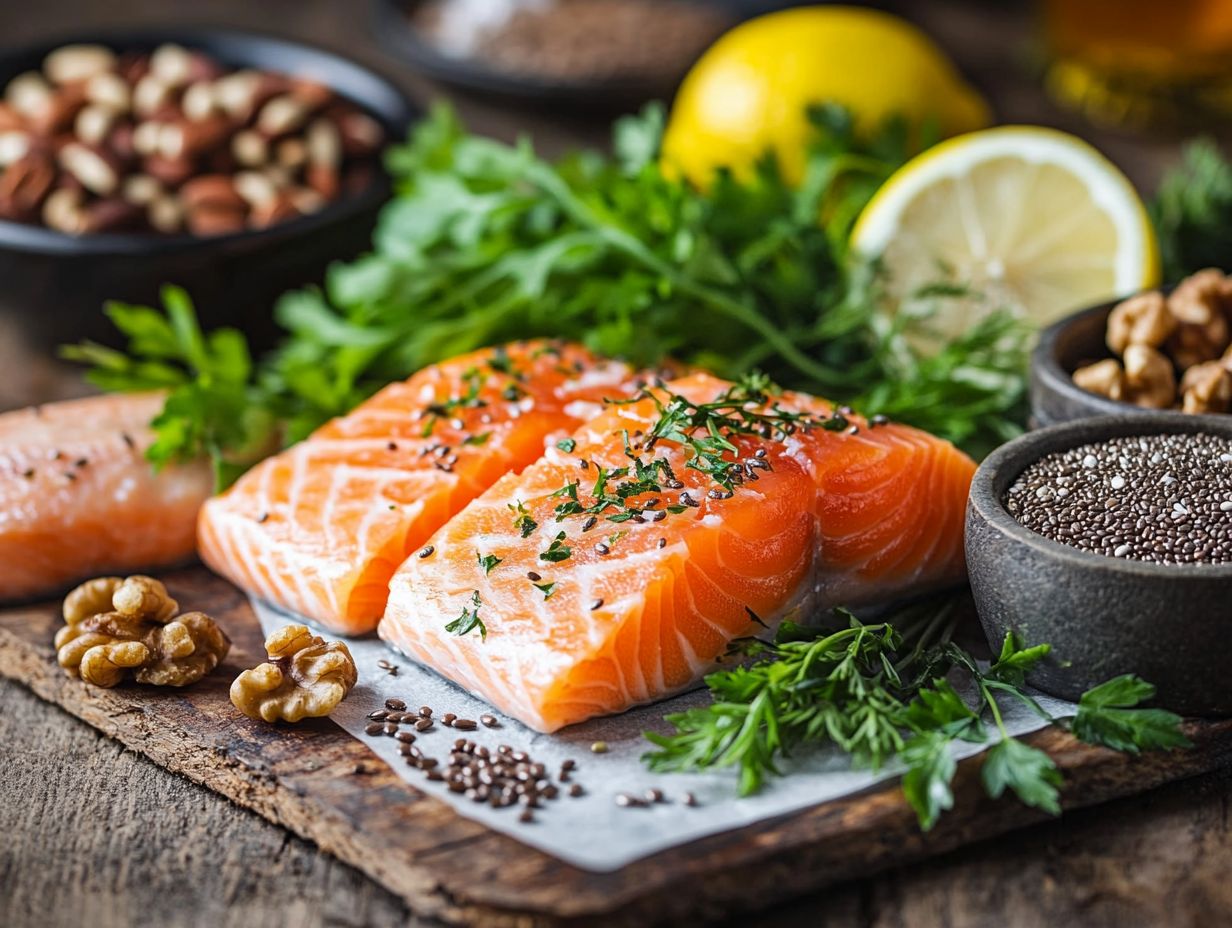
Algae is an extraordinary source of omega-3 fatty acids, especially DHA. It s an excellent alternative for those seeking vegan options for this essential fat, particularly if fish isn t part of your diet.
This plant-based choice delivers a good amount of omega-3s while embracing sustainable practices. It has a significantly lower environmental impact compared to traditional fish sources.
Feel confident knowing there s less risk of overfishing and a reduced carbon footprint during its cultivation. Algal oil offers the same cardiovascular and cognitive health benefits as fish oil, without the risk of contaminants like mercury or PCBs that often affect marine life.
By welcoming this innovative supplement into your routine, you can enjoy a healthy alternative while contributing to ecological balance.
15. Supplements
Omega-3 supplements, rich in EPA and DHA, are an effective way to boost your omega-3 intake. This is especially helpful if you have dietary restrictions or are dealing with omega-3 deficiency.
These supplements come in various forms, including fish oil, krill oil, and algal oil, each offering unique benefits and sources of omega-3 fatty acids.
For instance, algal oil, derived from algae, stands out as a plant-based option that is particularly appealing to vegetarians and vegans.
Omega-3 supplements are great for your heart, reducing inflammation, and boosting brain function. Aiming for about 250-500 mg of combined EPA and DHA is often recommended for daily dosage.
While supplements can be beneficial, remember that whole food sources like fatty fish, nuts, and seeds provide additional nutrients and may represent a more holistic approach to achieving optimal health.
What Are Omega-3 Fatty Acids and Why Are They Important?
Omega-3 fatty acids are essential fats crucial for many bodily functions, from reducing inflammation to lowering the risk of cardiovascular disease. This makes them a vital part of a healthy diet.
These fatty acids are categorized into three main types: alpha-linolenic acid (ALA), eicosapentaenoic acid (EPA), and docosahexaenoic acid (DHA). ALA, mainly sourced from plants like flaxseeds and walnuts, is a vital building block for your body. In contrast, EPA and DHA, found predominantly in fish and algae, are known for their strong anti-inflammatory effects and significant benefits for brain health.
Incorporating these omega-3s into your diet is essential. A deficiency might lead to adverse outcomes, such as an increased risk of heart disease, cognitive decline, and a weakened immune system. Ensuring adequate intake is crucial for your overall well-being.
What Are the Different Types of Omega-3 Fatty Acids?
There are three main types of omega-3 fatty acids: alpha-linolenic acid (ALA), eicosapentaenoic acid (EPA), and docosahexaenoic acid (DHA). Each of these plays a unique role in promoting your health.
ALA is primarily sourced from plant-based foods like flaxseeds, walnuts, and chia seeds. It s essential for maintaining heart health and reducing inflammation.
On the other hand, EPA and DHA, mainly found in fatty fish such as salmon, mackerel, and sardines, are vital for optimal brain function. They ve even been linked to improved mood and cognitive performance.
Research shows that these omega-3s can lower the risks of chronic diseases, including heart disease, arthritis, and certain types of cancer. By integrating these essential fatty acids into your diet, you can enhance your overall health and effectively address various health concerns.
Don t miss out on the incredible benefits of omega-3s! Discover how to incorporate these fats into your meals today!
What Are the Health Benefits of Omega-3 Fatty Acids?
Omega-3 fatty acids offer remarkable health benefits, including better brain function, reduced inflammation, and a significantly lower risk of heart disease.
These essential fats, primarily found in fish oil and certain plant sources, support heart health by lowering triglyceride levels and improving your overall lipid profile.
Research shows that omega-3s can help ease symptoms of anxiety and depression, providing crucial mental health benefits for your well-being. Their anti-inflammatory properties also support joint health and may help alleviate conditions like arthritis.
Start adding omega-3s to your diet today for a healthier body and mind!
How Much Omega-3 Fatty Acids Should One Consume?
The recommended intake of omega-3 fatty acids varies based on factors like age, gender, and health goals. However, general guidelines suggest aiming for a minimum of 250-500 mg of combined EPA and DHA each day for optimal health.
Health organizations such as the American Heart Association and the World Health Organization emphasize the importance of these essential fats for cardiovascular health, brain function, and inflammation reduction.
To determine your specific omega-3 needs, evaluate your dietary habits, including how often you consume fish and the overall variety of your diet.
If meeting these recommendations through food alone is challenging, you might consider omega-3-rich supplements. High-quality fish oil or algae-based options can help ensure adequate intake, promoting better health tailored to your needs.
What Are Some Other Sources of Omega-3 Fatty Acids?
In addition to popular fish like salmon and mackerel, there are several other food sources rich in omega-3 fatty acids. For those seeking more options, you can explore the best sources of omega-3 fatty acids, including vegan choices like flaxseeds, chia seeds, and walnuts, along with omega-3 supplements for those with dietary restrictions.
To enjoy a well-rounded intake, incorporate these diverse sources into your meals throughout the week. For example, adding a tablespoon of ground flaxseed to your smoothies or oatmeal can significantly boost your omega-3 levels.
Sprinkling chia seeds on yogurt or adding walnuts to salads not only enhances flavor but also adds essential nutrients.
If convenience is key, omega-3 fortified foods, such as certain brands of eggs or plant-based milks, can easily fit into your diet. By combining these options, you can enjoy the many health benefits of omega-3s while supporting both heart and brain health.
Frequently Asked Questions
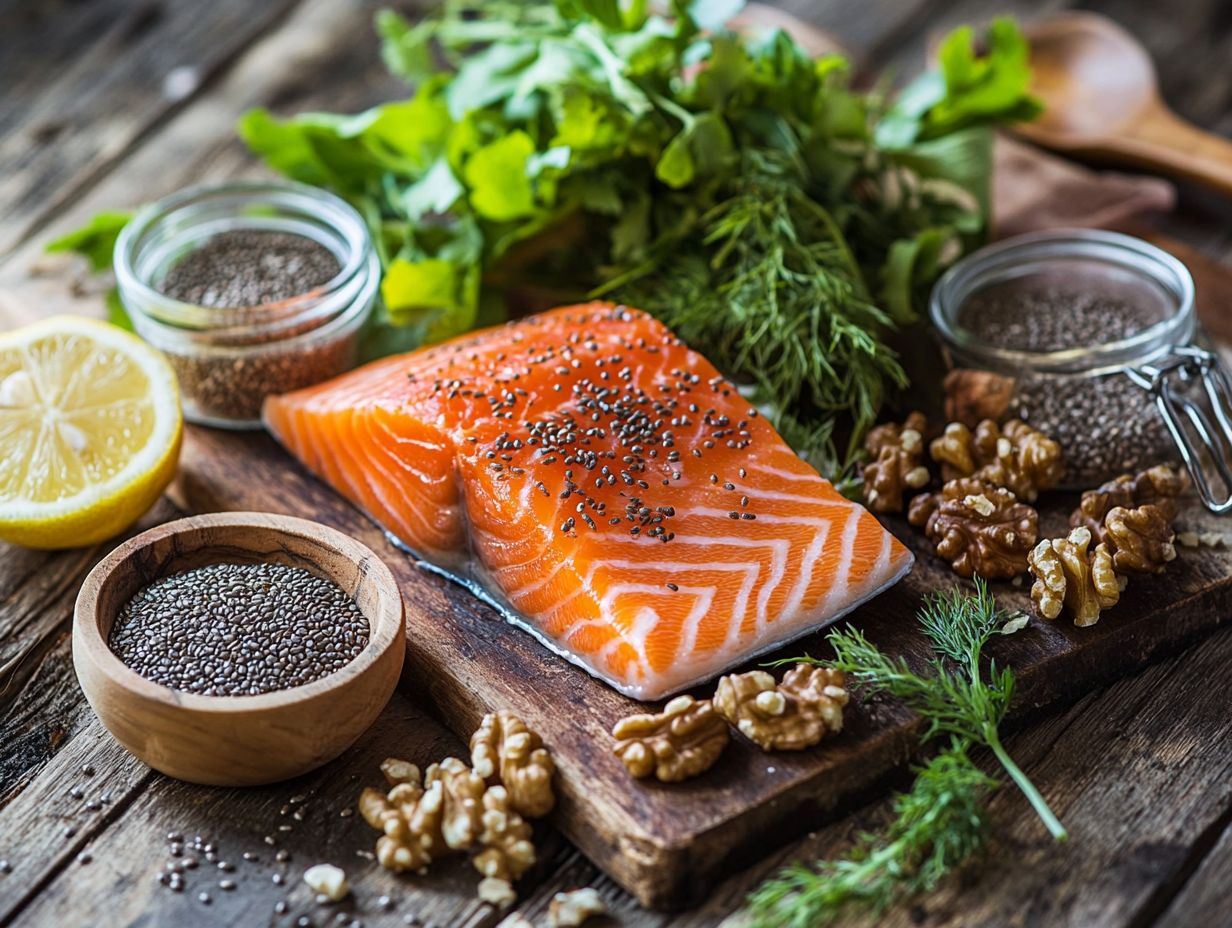
What are omega-3 fatty acids?
Omega-3 fatty acids are essential fats that our bodies cannot produce. They play a vital role in brain development, heart health, and controlling inflammation.
Why is it important to include foods rich in omega-3 fatty acids in our diet?
Including omega-3 fatty acids in our diet is crucial for maintaining overall health and preventing chronic diseases. They are linked to a reduced risk of heart disease, improved cognitive function, and decreased inflammation in the body.
What are some sources of omega-3 fatty acids?
Ten foods rich in omega-3s include fatty fish like salmon, mackerel, and sardines, along with plant-based options such as flaxseeds, chia seeds, and walnuts. For more information, check out the top seafood sources for omega-3s.
Can vegetarians and vegans get enough omega-3 fatty acids from their diet?
Yes, vegetarians and vegans can obtain enough omega-3 fatty acids from plant-based sources such as flaxseeds, chia seeds, walnuts, and leafy greens. They can also choose supplements made from algae or other plant sources.
How much omega-3 fatty acids should I consume daily?
The recommended daily intake of omega-3 fatty acids is 250-500 mg. This can be easily achieved by including a variety of foods rich in these healthy fats in your diet.





